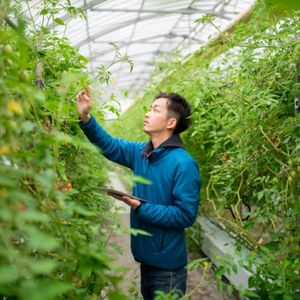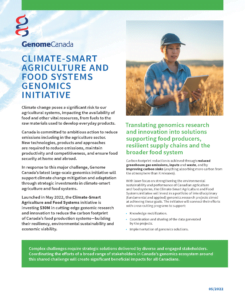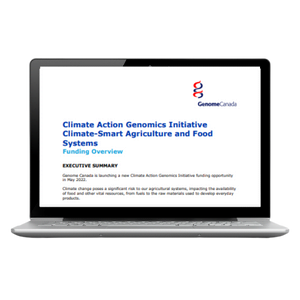Home / Challenge areas / Climate-Smart Agriculture and Food Systems
Climate-Smart Agriculture and Food Systems
Rising to the challenge
Launched in May 2022, the Climate-Smart Agriculture and Food Systems initiative is investing $30M in cutting-edge genomic research and innovation to reduce the carbon footprint of Canada’s food production systems—building their resiliency, environmental sustainability and economic viability.
Climate change poses a significant risk to our agricultural systems, impacting the availability of food and other vital resources, from fuels to the raw materials used to develop everyday products.
Canada is committed to ambitious action to reduce emissions including in the agriculture sector. New technologies, products and approaches are required to reduce emissions, maintain productivity and competitiveness, and ensure food security at home and abroad.
In response to this major challenge, Genome Canada’s latest large-scale genomics initiative will support climate change mitigation and adaptation through strategic investments in climate-smart agriculture and food systems.
Quick read
Translating genomics research and innovation into solutions supporting food producers, resilient supply chains and the broader food system
Carbon footprint reduction is achieved through reduced greenhouse gas emissions, inputs and waste, and by improving carbon sinks (anything absorbing more carbon from the atmosphere than it releases).
With laser-focus on strengthening the environmental sustainability and performance of Canadian agriculture and food systems, the Climate-Smart Agriculture and Food Systems initiative will invest in a portfolio of interdisciplinary (fundamental and applied) genomics research projects aimed at achieving these goals.
The initiative will connect their efforts with cross-cutting programs to support:
- Knowledge mobilization.
- Coordination and sharing of the data generated by the projects.
- Implementation of genomics solutions.
Complex challenges require strategic solutions delivered by diverse and engaged stakeholders. Coordinating the efforts of a broad range of stakeholders in Canada’s genomics ecosystem around this shared challenge will create significant beneficial impacts for all Canadians.
Reducing Canada's carbon footprint
Our new initiative will fund a portfolio of interdisciplinary genomics research and innovation projects aimed at reducing the carbon footprint of Canadian agriculture and food production.
We will support cross-cutting programs designed to increase portfolio value and optimal delivery of knowledge mobilization, data coordination and implementation across Canada. A portfolio approach allows benefits from one solution to translate into other production systems or supply chains and cascade impact throughout the broader national food system.

Potential impacts

Resilient and sustainable food systems
Building resilient, sustainable food systems that reduce environmental impacts and greenhouse gas emissions.

Net-zero carbon agriculture and food systems
Reducing greenhouse gas emissions and the carbon footprints of food production and inputs manufacturing.

Biological carbon sequestration
Enhancing carbon sequestration to improve performance, mitigate climate impacts and support healthy ecosystems.

Scalable biology-based solutions
Resulting in novel, nature-based solutions and processes that can replace traditional consumptive production processes with sustainable and circular solutions for the environment and economy.
Programs
Three programs will drive the Climate-Smart Agriculture and Food Systems initiative.
Interdisciplinary Challenge Teams (ICTs)
Approx. $24M
Teams of researchers and receptors addressing specific questions that will deliver innovative genomics solutions that support climate change mitigation and action.
Knowledge Mobilization and Implementation Coordination Hub (KMIC Hub)
Approx. $2M
Cross-cutting funding to develop and implement a plan to coordinate knowledge mobilization strategies across the ICTs and support portfolio-level GE3LS research and genomics in society activities for knowledge mobilization and implementation.
Data Coordination and Collaboration Hub (Data Hub)
Approx. $4M
Cross-cutting funding to develop and implement a portfolio-level plan to coordinate data assets, standards and analytics across Interdisciplinary Challenge Teams.
By the numbers
Genome Canada to kickstart the initiative
delivering genomics solutions for climate
change mitigation and action
Genome Canada to any single project,
and $1M minimum
and implementation
for each Genome Canada-led project,
doubling investment
Timeline
Interdisciplinary Challenge Teams
- May 12, 2022: First funding opportunity announced, registration begins
- Early July 2022: Registration deadline*
- July 20, 2022 (1:00-2:30 pm ET): Virtual information session with members of registered ICTs
- Mid-Sept. 2022: Letter of intent (LOI) deadline*
- Early Nov. 2022: LOI results released, applications begin
- Mid-Jan. 2023: Application deadline*
- March 2023: Application notification of decisions released
- May 2023: Teams convene
*Funding applicants should consult their regional Genome Centre for their specific deadlines.

SAVE THE DATE
July 20, 2022 (1:00-2:30 pm ET)
Virtual information session with members of registered ICTs
Contact
Contact Genome Canada: climateaction@genomecanada.ca
Or contact a regional Genome Centre directly. Genome Centre contacts are listed in each funding opportunity.

